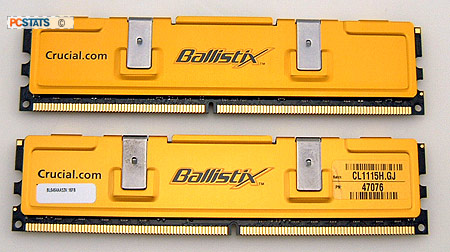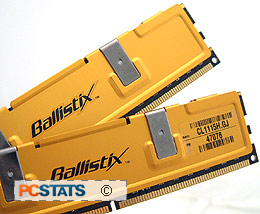Whether you
like it or not, it is DDR2's destiny to inherit the world. Like the
transition from SDRAM to DDR memory, critics are screaming bloody murder about the lack of a performance increase by moving to a more
advanced standard. Like last time this is a necessary move, but the
benefits may not be immediately noticeable. It's a required transition, and users really have no choice.
On the plus side, DDR2 memory prices have finally equalized, and come down to
reasonable levels. Consumers with PC systems based on DDR2 memory architecture no longer have to pay a premium on the type of RAM they need, just
to use the latest technology.
With all of
Intel's recent high-end processors running exclusively on DDR2-based
platforms, it is easy to see why migration has been slow. In the medium term,
Intel's mainstream 945P/G chipset should help bring the masses into the fold
quickly. It's a DDR2-only chipset, supports dual core Pentium 4 D processors, and offers
good performance as compared to the Intel 955X (also a DDR2-only chipset). AMD remains in
bed with DDR for the moment, but will also make the move to DDR2 RAM
sometime in 2006 if things go as anticipated.
Crucial is synonymous with reliable memory, and
enthusiasts have been flocking to its offerings since the company unleashed its
Ballistix series. In the following pages of this review, PCSTATS will be
benchmarking and overclocking a 1GB set of Crucial
Ballistix PC2-4200 DDR2 memory (2x 512MB) which come packed in bright
yellow/orange aluminum heatspreaders. The pair retails for about $219
CDN ($181 US).
 |
|
Crucial Ballistix PC2-4200 DDR2 |
|
|
 | |
All
DDR2 DRAM comes in a BGA packaging, and while this is more efficient and
runs cooler than the TSOP-II package, it is also more fragile. This partially why
memory makers are protecting DIMMs with heatspreaders. And a word of warning, don't try to remove those
heatspreaders unless you want to risk damaging that stick of memory; flexing the PCB will quite possibly
break the BGA solder contacts.

By default Crucial's Ballistix PC2-4200 runs at
DDR2-533 speeds with memory timings of 4-4-4-10, at
a voltage of 1.8V. Crucial has always been on the conservative side of 'enthusiast'
level gear, but we're hoping that this Ballistix DDR2 RAM will still be up to the overclocking
challenge.
PCStats Test Methodology and
Overclocking
PCstats tests DDR-2 memory on
Intel Pentium 4 platform, since DDR-2 has not yet been introduced into the AMD
Athlon64 world. While we do test to see how high the memory can go with
aggressive 3-3-3-9 memory timings and the 3/4 memory divider enabled, we also loosen things
up to see how high the memory can go when not shackled by tight timings.
The reason for this extra test is that Pentium 4 systems are not as reliant on lower
latency timings as AMD systems are, and having a higher clock speed can
counteract the negative effect of higher timings.
Because much of our audience is made up of enthusiasts, PCstats also runs
overclocking tests so you can get an idea of how far the memory can
be pushed. Got that? Good. Let's begin!
Overclocking and Stubborn Timings
 |
| Overclocking Results: |
|
|
Things did not start off very well for us because the
Ballistix PC2-4200 DDR2 wouldn't run with the agressive 3-2-2-7 memory timings
we threw at it right from the start... Its native CAS timings are 4-4-4-10.
After about an hour's worth of tinkering we gave up
trying to find more agressive timings what would work with the DIMMs,
and went forward with benchmarking the Crucial PC2-4200 memory at its
stock timings of 4-4-4-10.
Starting at 200 MHz FSB, the 266 MHz memory divider was enabled and I began to increase
the motherboard clock speed in 5 MHz intervals. Things went by pretty smoothly
for the most part, but we hit the first snag at 230 MHz. The system would
randomly reset itself when running PCMark04 and drop back to desktop when
running X2: The Threat. Increasing the memory voltage to an even 2.0V solved
those issues and I continued increasing the motherboard clock speed.
We soon experienced stability problems at 237 MHz,
this time though the symptoms were more severe; BSODs while loading Windows to no system POST. I increased
the memory voltage yet again to 2.1V and things seemed stable once more -
the default voltage for the memory is 1.8V. In the end, the Crucial
Ballistix PC2-4200 memory topped out at a maximum speed of 644 MHz, or 242 MHz
motherboard clock speed.
Loosening up the timings past 4-4-4-10 did not seem to help us overclock the memory further, and
performance was noticeably worsened.

